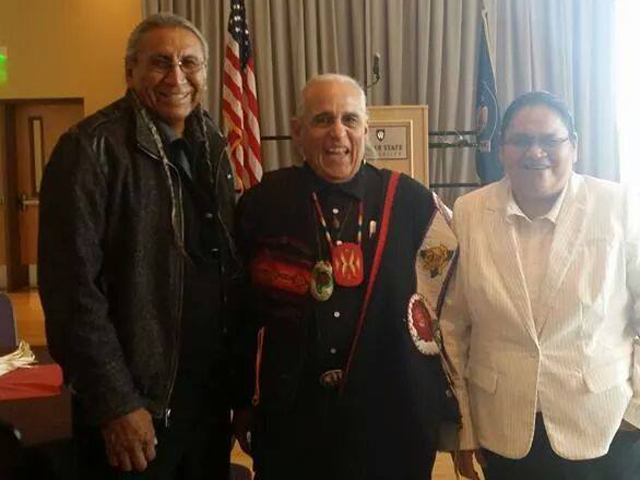
Lacee Harris (center) at the 9th Annual Native Symposium at Weber State University on November 12, 2014. (Photo/Adrienne Andrews)
In the Ute Indian Reservation, located in Northeastern Utah, approximately 150 miles east of Salt Lake City, it’s common to hear people say, “I’m going to go see Lacee.”
Lacee Harris is a 70-year-old Native healer. He has been healing all kinds of emotional and spiritual ailments, in and outside his community, for the past four decades. His duties include healing ceremonies for returning veterans, house cleanings, prayers, marriages, and naming babies.
“Some people call me a medicine man, but I don’t label myself a ‘medicine man’ or ‘shaman’ – that’s not our way,” says Harris, explaining it is not their custom to draw attention to themselves. “I grew up with my great grandmother. She taught me the healing traditions.”
Harris went to school and became a licensed clinical social worker – a position he held at the Indian Walk-In Center for 35 years. He says one day, when he was in his early 30s, his uncles had approached him.
“They said, ‘Boy, we want you to take on some responsibilities.’ So that’s how I became what I became,” says Harris.
He says there’s not that many healers left in his native Salt Lake City area.
“There’s maybe 350,000 people in Salt Lake, and I’m one of the few natives that do the ceremonies,” says Harris. “I volunteer at the local hospitals to give them blessings. I work with natives in Nevada, New Mexico at cancer centers…and I’ve done work with the Utah State Department of Human Services, adult corrections and youth corrections.”
He was asked a few months ago to help returning veterans dealing with their post-traumatic stress disorder (PTSD) in collaboration with the U.S. Department of Veterans Affairs (VA).
“I think it’s just a pilot here in Salt Lake for now,” says Harris. “If it starts succeeding, they will take it to Virginia to see how it works there.”
He explains the Native healing program had originally encountered resistance from the VA and Utah community, because many could not understand its spiritual aspect of healing.
“It’s a 24-7, 365-day type of job,” says Harris. “We get up in the morning, and we pray all day long, and we pray when we go to bed at night. They are scared of their own insecurities in their spirituality. We have no insecurity about who our Creator is.’
He goes on to explain that the Creator made us in four parts: physical, mental, emotional and spiritual.
“Many people are developed physically – they exercise, and they go to school for their mental ability. Emotional and spiritual…ahh, not so much,” says Harris. “People are driving around on two wheels instead of four. Four wheels give you more balance than two.”
The two-time cancer survivor says he carries a medicine bag of sacred dirt, sweet grass, crystals, a whole bunch of different medicines, traditionally given to Native warriors, with him at all times.
“It’s what helped me,” he says. “It’s that old spirituality that kept us a strong people. The Europeans came and brought all their diseases and destroyed our natural foods and animals that we ate, but we still keep our traditions…We are strong people, and we have to hang on to our ways.”
He says also being a licensed mental health therapist, he is fortunate to be able to use both scientific and traditional philosophies in his healing, because Western medicines don’t heal emotional or spiritual wounds. When he sees veterans, for example, he uses his cleansing ceremonies involving sweats, as well as talking circles – traditions that Natives used with their returning warriors for thousands of years.
“If we have problems, we would go out and sit on a hill and meditate,” continues Harris about his ancient traditions. “We would take out our tobacco that was made for us by the Creator…We ask for the endurance, and all the things we need to overcome adversities. Seeing your buddy shot or blown up – you have to find that sense of balance, and your place in the world with all the badness going on around you.”
He goes on to say that’s why so many veterans get into drugs.
“They are trying to drown and hide from all of that trauma and negativity that has been surrounding them. It’s not an easy thing. Once they can find a way to deal with those negativities, it’s much easier to deal with,” says Harris. “It might take several times going to a sweat, talking with elders, hearing the old stories…You gotta get out of your head. That’s where all the worries live. Go into your heart, that’s your center. If you operate from your center, you can talk to your Creator.”
Harris plans on continuing to help others and spread the wisdom of his people as long as he can. Last week, he spoke at the 9th Annual Native Symposium at Weber State University.
“I think the best advice I could give to any young person is know and understand and live to the fullest your life’s philosophy,” says the healer. “A lot of people I know are Christians. Hold on to that, that’s the one thing that will get you through.”
